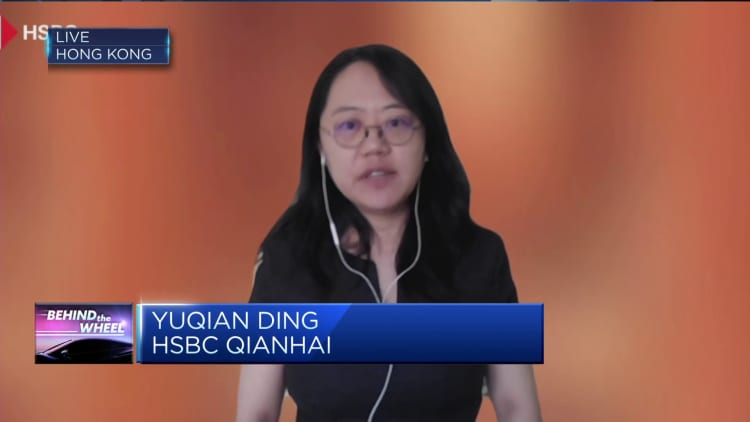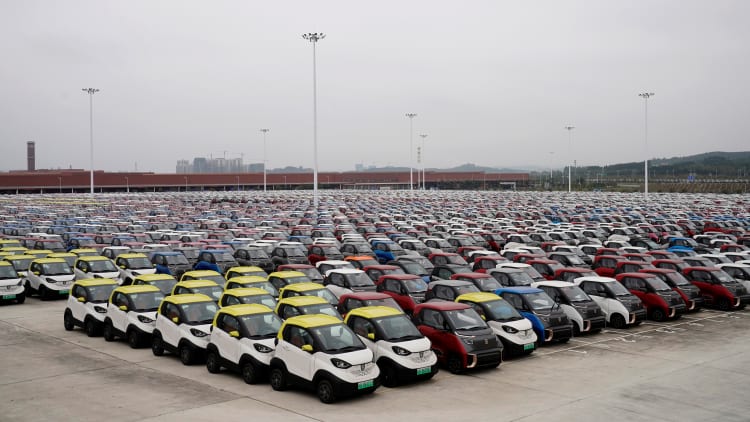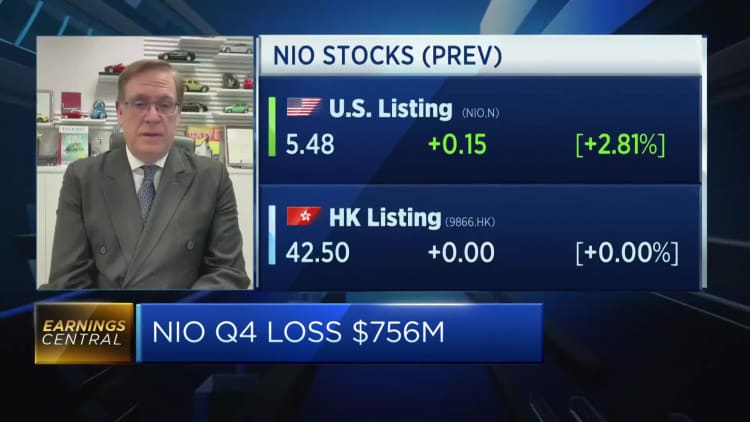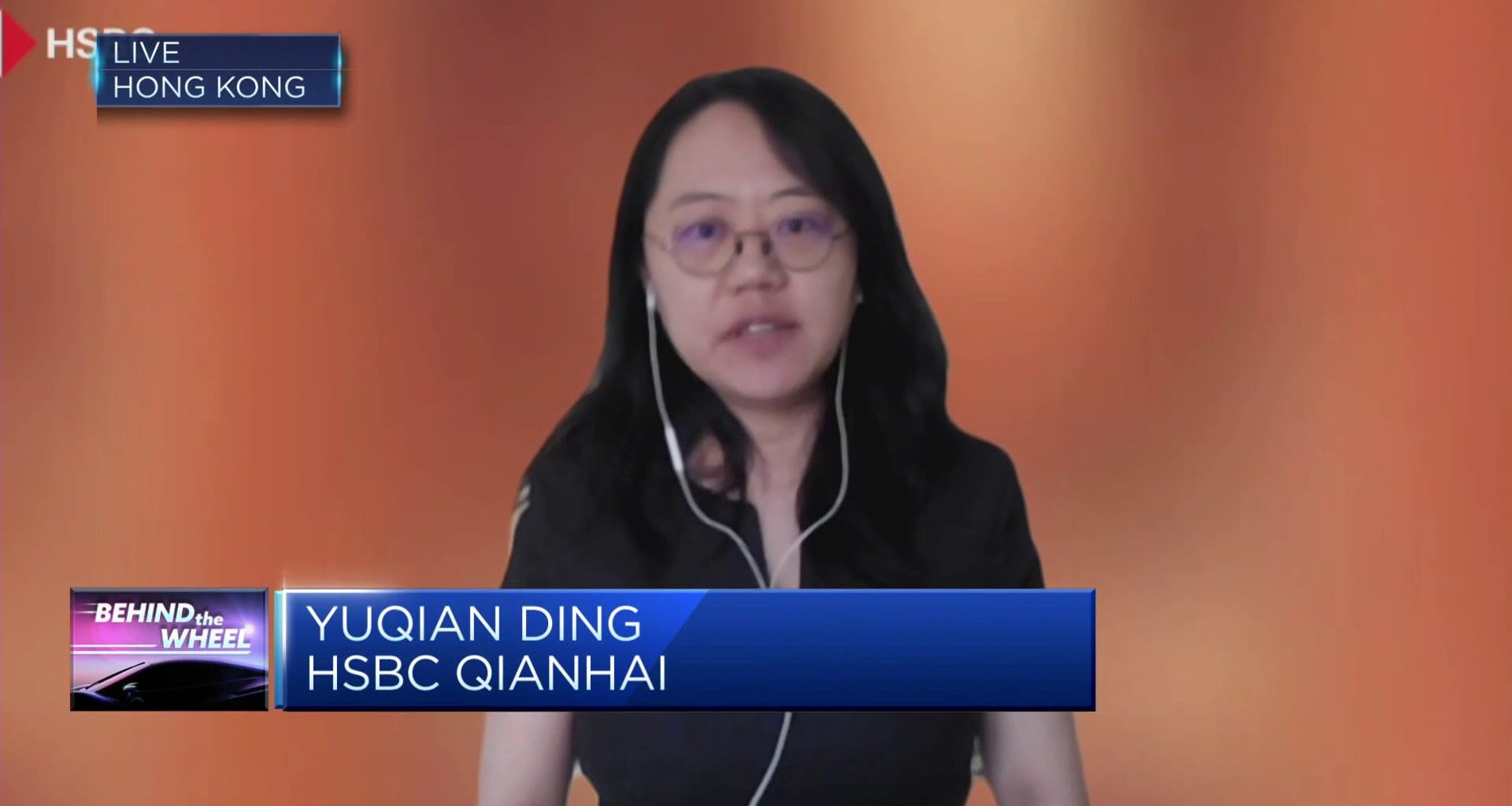BYD electric cars waiting to be loaded onto a ship are seen stacked at the international container terminal of Taicang Port in Suzhou, in China’s eastern Jiangsu province on February 8, 2024.
STR | AFP | Getty Images
In the race against Tesla for the global electric car market, Chinese automaker BYD is pushing hard overseas despite rising barriers to the U.S. market.
The Shenzhen-based company has already tested the waters in a number of countries with some immediate sales success, often just one year after entering.
Given policy uncertainty around Chinese EV exports to major markets like the U.S. and Europe, BYD is seeking to bolster overseas sales by moving production to regions perceived as more friendly. Already, the company has factories in Thailand, Brazil, Indonesia, Hungary and Uzbekistan in the works.
“They are targeting countries without very strong domestic auto industries, where they are likely to face less political pushback or headwinds from a policy perspective,” said CLSA research analyst Xiao Feng, noting that recent developments in the U.S. underscored the need for such an approach.
The Biden administration last month said it’s begun investigating whether Chinese-made cars pose national security risks, and raised the possibility of restricting the vehicles. The U.S. has tried to support adoption of electric cars domestically, but sales penetration is well below that of China.

BYD is moving quickly, beginning with Thailand, where the company expects its first factory outside China to be in operation by the end of this year. The automaker surpassed Toyota to grab the top spot for passenger car sales in Thailand in January, despite having no sales there just one year prior, according to data from Marklines.
Once operating, the Thailand factory will likely serve the rest of Southeast Asia. EY predicts the electric car market in the region will grow exponentially to at least $80 billion a year in sales in the next decade.
BYD has established itself in Southeast Asia as the top-selling EV brand, grabbing more than one-third of the market last year after barely selling cars there previously, according to data from Counterpoint Research.
Edge against Tesla
BYD sold 70,000 electric cars in Southeast Asia last year with a 35% market share, putting it ahead of rivals Vinfast and Tesla, according to data from Counterpoint Research.
One of BYD’s advantages over Tesla is a number of offerings in the mass market, as well as a mix of hybrid and battery-powered cars. Tesla exclusively makes more premium-priced, battery-only cars. Having hybrid options is beneficial for emerging markets where battery-charging infrastructure remains limited.
Southeast Asia will likely remain BYD’s strongest overseas market in the short term as the company pursues its goal of doubling its car exports from last year to 500,000 in 2024, according to Canalys automotive analyst Alvin Liu.
“The Southeast Asian EVs market is still in its early stages, and consumer habits need to be cultivated,” said Liu. “Cost-effectiveness” is particularly important, he added, with BYD’s Atto 3 and Dolphin models sold in the region at very competitive prices.

The company is also investing $1.3 billion to build an electric car factory in Indonesia in 2024, local media reported in January. This year, BYD also reportedly plans to significantly increase the number of its stores in Singapore and the Philippines.
The company did not respond to a request for comment about the reported plans.
While BYD does not break out capital expenditure by country, it disclosed 81.52 billion yuan ($11.33 billion) in autos-related capex in the first six months of 2023, nearly double the 45.94 billion yuan reported for all of 2022.
In another contrast with Tesla’s direct-dealership model, BYD often relies on local distributors and partners for sales in countries outside China. For example, in late 2022, BYD signed a distribution agreement with Sime Darby Motors in Malaysia.
Plan for the Americas
While U.S. scrutiny on China’s electric vehicle dominance is only growing, BYD is expanding in Brazil and has its sights on Mexico, on the U.S. border.
The company’s Americas CEO Stella Li told Reuters BYD is considering plans for a factory in Mexico, where it has started selling more electric cars.
If BYD does build a factory in the country, that could make it a “beachhead for the Americas,” Bill Russo, founder and CEO of investment advisory firm Automobility, recently told CNBC’s “Squawk Box Asia.”
“Mexico is part of the USMCA so there is an opportunity to export perhaps from Mexico to North America,” he said, referring to the free trade agreement that the United States, Mexico and Canada enacted in 2020.

BYD does not plan to sell passenger cars to the U.S., Li reportedly said at the end of February.
The automaker did not respond to a request for comment on this story.
China remains by far BYD’s largest market. Out of more than 3 million new energy passenger vehicles the company produced last year, just over 242,000 went overseas.
The rapid growth of BYD and other Chinese electric car companies has other automakers worried.
In February, the Alliance for American Manufacturing released a report warning that low-cost Chinese imports could be an “extinction-level event for the U.S. auto sector” and called on Washington to prematurely block imports from Mexico.
That was just weeks after company releases confirmed that BYD was well ahead of Tesla in terms of vehicle production.
Europe and other markets
A global push to go electric has given Chinese automakers potential market opportunities, especially as growth slows at home.
“BYD needs to look for more overseas opportunities in other regions where the EV penetration will accelerate with infrastructure development for its long-term sustainable growth, not losing share against the US and European automakers,” said Liz Lee, associate director at Counterpoint Research.
BYD announced late last year it would open a factory in Hungary, and in January said production would start in three years.
The news came just months after the European Union announced a probe into the role of subsidies in China-made electric cars.
BYD is also selling cars in Australia, the Middle East and Africa, and in January announced the launch of production at its jointly owned facility in Uzbekistan.
Read More: World News | Entertainment News | Celeb News
CNBC









